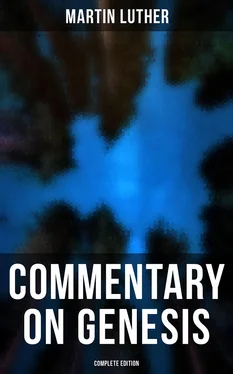Martin Luther - Commentary on Genesis (Complete Edition)
Здесь есть возможность читать онлайн «Martin Luther - Commentary on Genesis (Complete Edition)» — ознакомительный отрывок электронной книги совершенно бесплатно, а после прочтения отрывка купить полную версию. В некоторых случаях можно слушать аудио, скачать через торрент в формате fb2 и присутствует краткое содержание. Жанр: unrecognised, на английском языке. Описание произведения, (предисловие) а так же отзывы посетителей доступны на портале библиотеки ЛибКат.
- Название:Commentary on Genesis (Complete Edition)
- Автор:
- Жанр:
- Год:неизвестен
- ISBN:нет данных
- Рейтинг книги:4 / 5. Голосов: 1
-
Избранное:Добавить в избранное
- Отзывы:
-
Ваша оценка:
- 80
- 1
- 2
- 3
- 4
- 5
Commentary on Genesis (Complete Edition): краткое содержание, описание и аннотация
Предлагаем к чтению аннотацию, описание, краткое содержание или предисловие (зависит от того, что написал сам автор книги «Commentary on Genesis (Complete Edition)»). Если вы не нашли необходимую информацию о книге — напишите в комментариях, мы постараемся отыскать её.
Commentary on Genesis is the last work of Martin Luther, written during the last several years of his life. Luther's work follows the first volume of Psalms with critical and devotional remarks on the creation and on sin and the flood.
Commentary on Genesis (Complete Edition) — читать онлайн ознакомительный отрывок
Ниже представлен текст книги, разбитый по страницам. Система сохранения места последней прочитанной страницы, позволяет с удобством читать онлайн бесплатно книгу «Commentary on Genesis (Complete Edition)», без необходимости каждый раз заново искать на чём Вы остановились. Поставьте закладку, и сможете в любой момент перейти на страницу, на которой закончили чтение.
Интервал:
Закладка:
V. 2b. And darkness was upon the face of the deep.
The "water," the "deep," and the "heavens," are here put for the same thing; namely, for that dark unformed substance which afterwards was divided by the Word. For it was the office of the second Person of the Trinity, namely Christ, the Son of God, to divide and adorn that chaotic mass produced from nothing. And this may have been the very design of Moses in not mentioning the Word in the first place; that is, in not saying at first, "And God said." For some maintain that this was done by Moses purposely.
V. 2c. And the Spirit of God moved upon the face of the waters.
Some consider "the Spirit of God" here to mean merely the wind. But if anything material is here to be understood by "Spirit," I should rather refer it to the first moving of the original unformed mass of heaven and earth, which is called "the deep," which is always in motion to this day; for water is never still, its surface is always in motion. But I prefer here to understand the Holy Spirit. For the wind is a creature which did not exist, while as yet the heavens and the earth lay in that confused chaotic mass.
There is moreover an universal agreement of the Christian Church concerning a revelation of the mystery of the Holy Trinity in this first creative work. The Father through the Son, whom Moses here calls the Word, creates "the heavens and the earth" out of nothing. Over these the Holy Spirit broods. And as a hen sits upon her eggs that she may hatch her young, thus warming her eggs and as it were infusing into them animation, so the Scriptures say the Holy Ghost brooded as it were on the waters; that He might infuse life into these elementary substances which were afterwards to be animated and garnished. For the office of the Holy Spirit is to give life.
These explanations, as far as I see, are sufficient for our present purpose. Wherefore casting away all other diverse opinions, let us set down this as the truth, that God created "the heavens and the earth," as yet a rude mass, out of nothing; so that the earth, as an unformed chaotic mass, enveloped the heaven as yet also an unformed mass, like a dark, circumfluent, nebulous cloud.
It is necessary however that we discuss the terms here used. At the very beginning of this discussion we are met by the expression "In the beginning." Some have expounded the words "In the beginning" as meaning "In the Son," from John 1:1; seeing that Christ also gives to the Jews when they inquired "who He was?" this answer, "The beginning, who also speak unto you," John 8:25. This same exposition is given also from Ps. 110:3, "With thee is the Beginning, in the day of thy power;" which passage nearly all commentators expound as meaning, "With thee is thy Son in divine power." But it is well known to those acquainted with the Greek language that the expression tan Archan should be rendered by an adverbial phraseology "at first" or "in the beginning," etc. It is a figure of speech which we frequently meet in Greek. Wherefore let those who will, amuse themselves by thus interpreting the expression "In the beginning." I prefer the simplest explanation which can be at once understood by the less learned.
My belief is therefore that the design of Moses was to signify the beginning of time; so that "In the beginning" has the same meaning as if he had said, "At that time before which there was no time." Or he means that when the world began it so began that the heavens and the earth were created by God out of nothing; but created in a rude shapeless mass, not formed and beautified as they now are. Though they lay not long thus, but began immediately on the first day to be garnished with the light.
The Arians imagined that angels and the Son of God were made before "the beginning." But let us pass by this blasphemy. We will omit also another question, "What was God doing before the beginning of the world;" was he in a state of entire inaction or not? To this question Augustine introduced in his Confession the reply, "He was making a hell for all searchers into his secrets." This reply says Augustine was made to ridicule the violent and audacious blasphemy of the question.
The modesty therefore of Augustine pleases one, who elsewhere candidly says that in all such cases he draws in the sails of his thoughts. For if we speculate and dispute to infinity, these things still remain incomprehensible. Even those things which we see we can understand but little. How much less then shall we grasp in our knowledge such things as these. For what will you determine concerning things that were before and beyond time? Or what can be your thoughts of things God did before time was? Wherefore let us away with all such thoughts and believe that God before the creation of the world was incomprehensible in his essential rest, but that now since the creation he is within and without and above all creatures; that is, he is still incomprehensible. This is all that can be said, because that which was outside of time our intellect can not comprehend.
Wherefore God does not manifest himself in anything but in his works and in his Word; because these can in some measure be comprehended, all other things which properly belong to his divinity, cannot be comprehended or understood, as they really are; such as those things which were beyond time and before the world's creation, etc. Perhaps God appeared to Adam unveiled; but after his sin he may have shown himself to him in "a noise," Gen. 3:8, under which he was covered as with a veil. So also later in the tabernacle God was veiled by the sanctuary; and in the desert by the pillar of a cloud and by the pillar of fire. Wherefore Moses also calls these things "appearances" or "shadowings" of God, by which he then manifested himself. And Cain calls that the "face" and the "presence" of God where he had before offered his sacrifices, Gen. 4:14. For our nature is so deformed by sin, yea corrupted and lost, that it cannot understand God naked and unveiled nor comprehend what he really is. Therefore it is that these covering veils are absolutely necessary.
It is moreover insanity to dispute much concerning God as to what he was beyond and before time, for that is to desire to comprehend naked divinity or the naked divine essence. And it is for this very reason that God has wrapt himself in the veils of his works and under certain visible appearances, just as at this day he veils himself under baptism, absolution, etc. If you depart from these veiling signs, you at once run away beyond measure, beyond place and beyond time into the most absolute nothing; concerning which, as philosophers say, there can be no knowledge. Therefore it is that we with solemn propriety enter not into this question; but rest content with this simple meaning of the expression, "In the beginning."
II. But it is more worthy of observation that Moses does not say "In the beginning, ADONI, the Lord created the heavens and the earth;" but he uses a noun of the plural number ELOHIM; by which name, in the Books of Moses, and in other parts of the Scriptures both angels and magistrates are sometimes called. As in Ps. 82:6, "I have said ye are gods." It is certain however that here it signifies the one true God, by whom all things were made. Why therefore does Moses here use a plural noun or name?
The Jews cavil at Moses in various ways. To us however it is clear that the intent of Moses is to set forth directly the Trinity; or the plurality of persons in the one divine nature. For as he is speaking of the work of the creation it manifestly follows that he excludes angels, who are creatures, from the creative work. There remains therefore this sacred conclusion of the whole matter; that God is One, and that this most perfect Unity is also a most perfect Trinity. For how otherwise does Moses use the plural number, "In the beginning ELOHIM created ."
Читать дальшеИнтервал:
Закладка:
Похожие книги на «Commentary on Genesis (Complete Edition)»
Представляем Вашему вниманию похожие книги на «Commentary on Genesis (Complete Edition)» списком для выбора. Мы отобрали схожую по названию и смыслу литературу в надежде предоставить читателям больше вариантов отыскать новые, интересные, ещё непрочитанные произведения.
Обсуждение, отзывы о книге «Commentary on Genesis (Complete Edition)» и просто собственные мнения читателей. Оставьте ваши комментарии, напишите, что Вы думаете о произведении, его смысле или главных героях. Укажите что конкретно понравилось, а что нет, и почему Вы так считаете.












